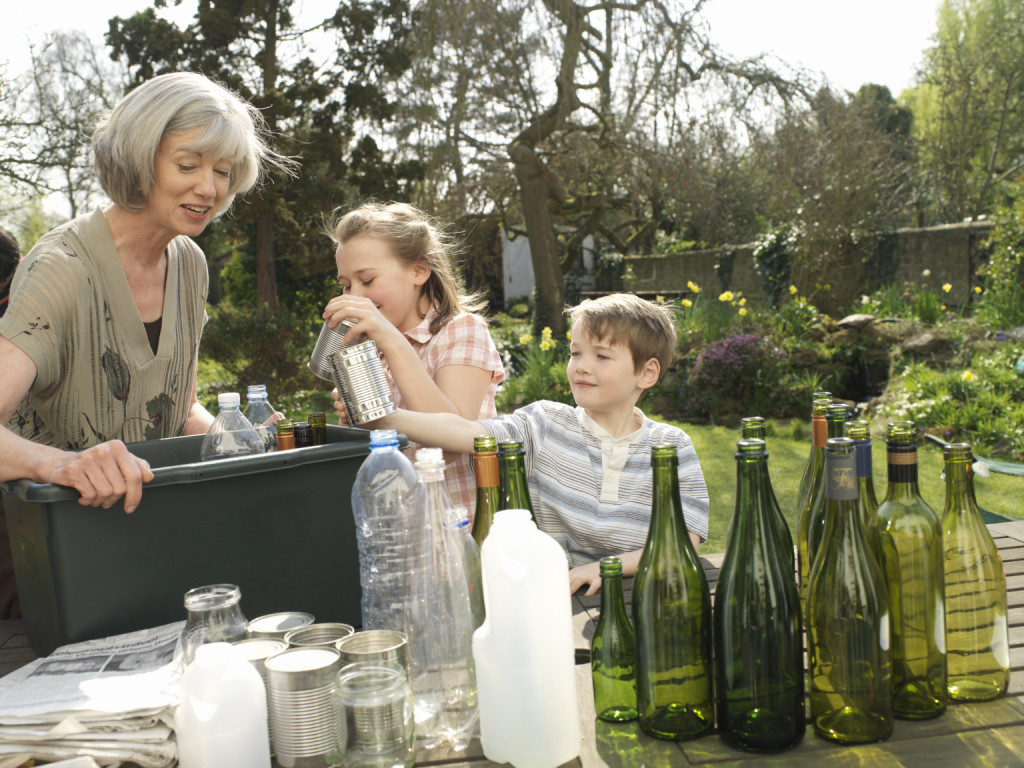
If you are trying to maintain a green home, it can be tough to get the entire family on board in order to live the eco-friendly lifestyle you are striving for. However, with a little creativity, you can teach your kids the habits that contribute to green living. Children are never too young to learn the importance of recycling, and contrary to popular belief, they aren’t too young understand how it works either. Like anything else with kids, putting a fun, positive spin on things goes a long way in getting them to absorb the lesson. Below, find tips and activities to get your child on board with recycling and get a little help around the house when it comes to maintaining a green lifestyle.
In it to Win it
Many kids are motivated by rewards, prizes, mere competition. Likewise, many children learn best through games and activities rather than lectures or demonstrations. If you turn recycling into a game, your kids will quickly join in the fun and learn the basics as they participate in mini-challenges. Encourage little ones to assist in family recycling by putting a sticker on chart every time they recycle a correct item (plastic bottle, tin can, etc). For every 10 deposits, give a small reward. Perhaps a piece of candy, or staying up 10 minutes past bedtime – whatever appeals to your child. Associating recycling with a positive reward will help your child see that it is important to you, much like cleaning their room or doing their homework.
Recycling Hunt
You can quickly turn a community cleanup into an adventurous scavenger hunt by presenting the task of recycling as a fun activity rather than a chore. If your community frequently has park or roadside cleanup projects, consider taking your kids along when appropriate. If you notice trash in a local area that your kids visit, you can start your own cleanup project for your family. To create a scavenger hunt, write out or draw items you’ll hunt: a plastic bottle with a lid, plastic bottle without a lid, aluminum can, plastic bag, and so on. Decide what the endgame is; perhaps the winner is the person with the most total items, or the person who found the most of a certain item. The winner gets a small treat or prize; perhaps an extra serving of dessert after dinner. (Find a printable list of items here.)
Learn About Ocean Trash
If your kids love animals, learning about the massive amounts of plastic floating in our oceans can give older kids insight as to how important doing their part really is. When you show children a problem they care about and teach them how they can help to solve it, their motivation will reach beyond treats and prizes. You can read about the Great Pacific Garbage Patch here to get information that will help you explain the problem to your kids.
Turn Trash to Crafts
Another important principle to teach kids is the concept of reusing—help them get in the habit of considering reusing items before tossing them out or recycling. Before recycling day, have kids go through the non-sticky stuff and pick out items they can reuse in a recycling project to create a new craft or toy. Tissue boxes, paper towel rolls, egg cartons and milk jugs are items most kids have no trouble finding use for. A cardboard box can quickly become a race car or a boat, and tin cans can act as a mini-bowling alley or drum set. They can even use these items for school art or science projects that require presentations.
However you get your children involved in recycling, they’ll be most excited if it’s something you do together as a family. So, talk about recycling, let your kids see you recycle, and praise them when they show green initiative. After a few fun recycling projects your kids will get in the habit, and eventually they will recycle without even thinking about it. The information for this article was provided by the professionals of King Recycling and Waste Disposal who specialize in waste management in Mississauga.




Wonderful ideas! In my opinion, personal example is really important! It is not enough to just told your kid to recycle or compost but never to show them how! The earlier we teach them, the easier they learn it and become responsible people later in their life!